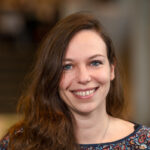
Elena Ponzoni connects in her work the fields of diversity and inclusion, philosophy of language and sociology of science. She has worked with research themes such as the role of migrant organizations in the Dutch welfare state, the inclusion of refugees in the labour market, how parenting support professionals engage with diversity, and the potential of social sciences to contribute to social change through forms of co-creation and participatory reflective research. She is the coordinator of the Refugee Academy and launched this initiative together with Halleh Ghorashi. Next to designing and organizing meetings together with various partners, she coordinates various ongoing research projects, writes proposals for future research in co-creation with societal partners, supervises students and junior researchers and maintains contacts with the Refugee Academy network. Furthermore, she also contributes as post-doc researcher to the VICI project Engaged Scholarship in Comparative Perspective.
‘My hope is that the processes of reflection, knowledge production and learning together that we initiate, can lead to actual improvement of the lives of refugees in the Netherlands and empower committed people from different positions to actually contribute to more inclusive spaces in society.’
What is your scientific background and expertise?
In my work I try to intersect the fields of diversity and integration, philosophy of language and sociology of science. Research themes I have worked on include the role of migrant organizations in the Dutch welfare state, the inclusion of refugees in the labour market, how parenting support professionals engage with diversity, and the potential of social science to contribute to social change through forms of co-creation and participatory reflective research.
What role do you have within the Refugee Academy, and what keeps you busy in this role?
I am coordinator of the Refugee Academy and launched this initiative together with Halleh Ghorashi. Next to designing and organizing meetings together with various partners, I write proposals for future research projects, supervise students and junior researchers and maintain contacts with our network.
What do you feel is the most important about/central to the Refugee Academy, and why?
The network we have created brings together very different types of expertise and offers a great chance to reflect on and challenge dominant ways of working and thinking about diversity and inclusion. One aspect that I feel as particularly important is that the Refugee Academy gives space and attention to the essential contribution of professionals with a refugee background to the field of refugee inclusion.
What is your personal ambition within the Refugee Academy, and how would you connect this to your work and/or life outside the Refugee Academy?
The Refugee Academy allows me to learn a lot together with others. My hope is that the processes of reflection, knowledge production and learning together that we initiate can lead to actual improvement of the lives of refugees in the Netherlands and empower committed people from different positions to actually contribute to more inclusive spaces in society.
Refugee Academy- related projects :
– Engaged Scholarship and Narratives of Change
– Learning Crossroads for Refugee Inclusion
– Towards an inclusive work environment! based on life stories
– Towards a structural place for refugees’ perspective and vision in policymaking
– 2incING project on Refugee-led Advocacy
– The House of Stories-(Het Verhalenhuis)



